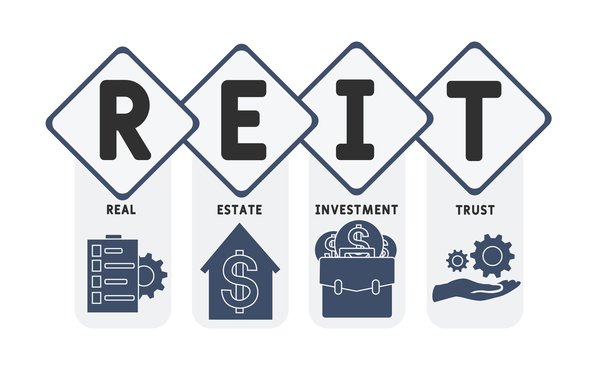Real estate investment trusts (REITs) play a vital role in the healthcare industry. Healthcare REITs operate many of the specialized facilities that healthcare systems and other health-related institutions need to deliver the best care for patients.
Here's a closer look at healthcare REITs. We'll consider whether these REITs are good investments. We'll also explore some attractive healthcare REIT options that investors should consider.

Understanding healthcare REITs
Healthcare REITs own, operate, manage, acquire, and develop healthcare-related real estate. These facilities include senior living communities, hospitals, medical offices, outpatient facilities, life science innovation and research properties, and skilled nursing facilities.
Most healthcare REITs make money by leasing space in their facilities to tenants such as healthcare systems, primarily under triple net leases. This lease structure requires the tenant to cover maintenance, real estate taxes, and building insurance. The structure provides REITS with a very predictable stream of rental income, making them ideal stocks to invest in during a recession.
Some healthcare REITs also operate the facilities they own, such as senior living communities. They typically hire a third-party manager who earns a fee for managing the property's day-to-day operations. The healthcare REIT generates net operating income from the fees paid on behalf of patients for their housing and any services provided. The income can vary due to fluctuations in occupancy levels and rates.
Advantages of investing in healthcare REITs
Healthcare REITs benefit from the massive and growing healthcare industry, one of the largest stock market sectors. While healthcare spending in the U.S. peaked at $3.8 trillion in 2019, it declined by 2% in 2020 due to the COVID-19 pandemic. However, it started growing again in 2021 and is on track to top $6 trillion by 2028.
Forecasts suggest the demand for healthcare-related real estate should continue growing. REITs are likely to benefit from steadily rising rental rates on existing properties. In addition, they should be able to develop new properties to meet the growing needs of the healthcare industry.
One of the drivers of the sector's projected growth is the aging of the baby boom generation. People older than 80 are expected to be one of the fastest-growing age groups through 2029. The increase in the ranks of the elderly should drive demand for senior housing and skilled nursing facilities. Such growth is likely to benefit healthcare REITs focused on those properties as they report higher occupancy levels, allowing them to raise their rates.
Risks of investing in healthcare REITs
While healthcare REITs are less risky than other healthcare stocks because of their generally stable rental income, they're not without risk. Here are some of the risks they face:
- Leverage risk: REITs borrow heavily to acquire and develop real estate. The debt reduces their financial flexibility during economic recessions.
- Interest rate risk: REITs are highly sensitive to changes in interest rates. Higher rates increase their cost of debt, given the sector's use of leverage. In addition, higher interest rates give income-focused investors more investment options that offer an attractive income yield, such as government and corporate bonds, which can weigh on REIT stock prices.
- Oversupply risk: Healthcare REITs need to match their development plans with demand. Given the highly specialized nature of most healthcare facilities, REITs need to be careful not to build too much supply or it might sit vacant.
- Tenant risk: Healthcare REITs rely on their tenants to pay rent and manage senior living facilities effectively. However, healthcare margins are relatively thin, which can cause operators to run into financial trouble if they're not vigilant. That can affect rental receipts and force a healthcare REIT to find a new tenant for their facility if an operator can't meet its financial obligations.
- Pandemic/flu season risk: Virus outbreaks can significantly affect healthcare REITs, especially those focused on senior housing. It can cause occupancy to decline as more patients check out than are admitted.
3 healthcare REITs to consider in 2024
According to the National Association of Real Estate Investment Trusts (NAREIT), 16 publicly traded REITs focus on healthcare-related real estate. That gives investors interested in the sector multiple options. A few stand out for their strong performance in recent years, including:
| Top Healthcare REIT | Ticker | Market Cap | Description |
|---|---|---|---|
| Community Healthcare Trust | (NYSE:CHCT) | $957.95 million | A diversified healthcare REIT. |
| CareTrust REIT | (NASDAQ:CTRE) | $1.9 billion | A healthcare REIT focused on skilled nursing, assisted living, and independent living facilities. |
| Medical Properties Trust | (NYSE:MPW) | $7.4 billion | A healthcare REIT focused on hospitals. |
Here's a closer look at these top-performing healthcare REITs.
1. Community Healthcare Trust
Community Healthcare Trust owns a diversified portfolio of healthcare facilities across tenant, geography, healthcare facility type, and industry segments. The company's portfolio includes acute inpatient behavioral facilities, physician clinics, behavioral health centers, specialty centers, inpatient rehabilitation facilities, long-term acute care hospitals, medical office buildings, and surgical centers and hospitals.
The company's diversified approach has paid big dividends over the years. This REIT has produced annualized total returns topping 18% during the past five years. As of early 2022, it had increased its dividend payment every quarter since its initial public offering in 2015.
The factor driving its growth is a steady stream of acquisitions. Community Healthcare Trust focuses on smaller off-market or lightly marketed transactions. By avoiding a competitive bidding process, it can acquire properties at higher cap rates (the net operating income yield on the investment).
This healthcare REIT is in an excellent position to continue increasing shareholder value. It has a conservative balance sheet, giving it the financial flexibility to acquire a diverse array of healthcare properties. Future deals should supply it with additional cash flow to continue increasing its dividend.
2. CareTrust REIT
CareTrust acquires and leases senior housing and healthcare properties. Most of its portfolio consists of skilled nursing facilities. However, it also owns assisted living facilities, senior living facilities, and campuses that include skilled nursing and assisted living facilities. CareTrust primarily owns net lease properties, operating only seven of its 224 properties as of early 2022. CareTrust's lease structure provides it with steady income.
This REIT's strategy has paid off over the years. It has been one of the top three best-performing healthcare REITs over the past one-, three-, and five-year periods. Aside from focusing on net lease properties, the other major driver of CareTrust's success in creating shareholder value is its investment strategy. It invests about $200 million annually, focusing on opportunities with higher cap rates. It leverages its deep industry relationships to acquire off-market and lightly marketed properties.
CareTrust should be able to continue growing in the coming years. It had a relatively low leverage ratio and a conservative dividend payout ratio, giving it ample financial flexibility to keep making acquisitions. Meanwhile, it has a steady pipeline of investments as it leverages its relationships to find attractive opportunities.
3. Medical Properties Trust
Medical Properties Trust focuses on owning hospitals in the U.S. and abroad. As of early 2022, it was the second-largest non-government owner of hospitals in the world. In addition to hospitals, this REIT also owns behavioral health facilities and freestanding urgent care facilities.
The company's focus on hospitals has paid off over the years. Over the past five years, this REIT has produced an average annualized total return of 18%. One factor driving this performance is its increased dividend in each of the past nine years. Since the end of 2018, the hospital owner has increased its dividend at a 3.8% annual rate. For comparison's sake, dividends in the healthcare REIT sector have fallen by an average of 10% during that time, mainly because many have reduced their payments during the pandemic.
A steady stream of acquisitions has produced transformative growth since 2019. This REIT has acquired $12.1 billion worth of real estate, creating an estimated $5.4 billion of shareholder value. With a solid balance sheet, growing funding sources, and a massive market opportunity, Medical Properties Trust should be able to continue increasing shareholder value in the coming years.
Related investing topics
A unique way to invest in the healthcare sector
Healthcare REITs will be one of the beneficiaries of the healthcare sector's continued growth. These companies should continue raising rents while experiencing healthy occupancy levels as baby boomers age, making it an excellent sector for investors to consider.



































